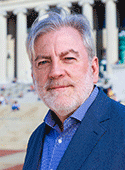Keynote speaker
Glenn Denning, Columbia University, USA

Dr Glenn Denning is Professor of Professional Practice and founding Director of the Master of Public Administration in Development Practice (MPA-DP) at Columbia University’s School of International and Public Affairs (SIPA).
Over the past 40 years, Denning has advised governments and international organizations on agriculture and food policy in more than 50 countries. Prior to joining SIPA, Denning has held senior management and research positions at the International Rice Research Institute, the World Agroforestry Centre, and the Earth Institute. Denning completed his BAgrSc and MAgrSc from the University of Queensland, MPA from the Harvard Kennedy School, and PhD from the University of Reading. He is the author of Universal Food Security: How to End Hunger While Protecting the Planet (Columbia University Press).
Talk: Universal food security: How to end hunger while protecting the planet
Abstract: Imagine a world where every person enjoys a healthy diet derived from sustainable food systems. Visualize a genuinely food-secure world where every person gets to consume the right quantity and quality of food to live a healthy, active, and productive life. No hunger. No obesity. No malnutrition. Take a further step to imagine a world where the food produced for those healthy diets is produced, managed and distributed in ways that do not harm the environment. This is universal food security.
This talk draws on the most relevant literature, expert opinion, and decades of personal experience of the speaker as a scientist and practitioner to lay out five key priorities—sustainable intensification, market infrastructure, postharvest stewardship, healthy diets, and social protection. Intelligent, coherent investment across these five areas in local context will enable food systems transformation toward a food-secure world.
Successful transformation of food systems inevitably involves decisions by very large numbers of individual people. These individuals make decisions on behalf of their households, their communities, their governments, their firms, and all other organizations that play a role in transforming food systems. This brings us to crucial question: Who will make those critical decisions and take actions that will lead to positive outcomes at the international, national, and local levels?
The answer is people who are willing and able to lead—we need bold and informed leadership across public, private, and third sectors, at all levels. But what are the characteristics of leadership needed to transform complex and dynamic food systems? This talk outlines the most essential characteristics of transformative leadership and how we can prepare and nurture a new generation of practitioner-leaders.
« Go Back